Let’s face it: maintaining a healthy mind and body is a never-ending journey, an investment that pays you back in dividends. But it doesn’t have to be an uphill battle filled with tiresome gym schedules and repetitive meal plans. Sitting right at the intersection of actionable advice and simple changes, the magic happens. You deserve the best for your health, and we are here to guide you through that journey.
Do you know that regular physical activity can reduce the risk of many chronic conditions, including coronary heart disease, stroke, type 2 diabetes, cancer, obesity, mental health problems, and musculoskeletal conditions?1 A study shows that Mental health disorders are the third most common cause of hospitalization in the U.S. for both youth and adults aged 18–44.
When it comes to fostering both a healthy mind and body, there’s no one-size-fits-all method. It’s about finding what works for you and weaving it into the fabric of your everyday life. From meditating to keeping yourself hydrated, each of these eight ways offers a unique contribution to keeping you happy and healthy.
This article is your guide, a roadmap if you will, to explore these eight beneficial ways. We’ll walk you through each step, elucidate their importance, and provide expert advice on how you can incorporate them into your routines. Are you ready to embark on this journey of achieving health and wellness? Let’s dive in!
8 Ways to maintaining a healthy mind and body
While each of these areas is vital in its way, the real magic lies in integrating all of them into your daily routine. This holistic approach to maintaining your physical and mental health can be incredibly beneficial and empowering. So let’s dive right into the strategies you can start to make use of today!
1. Meditation
Think about a calm, peaceful setting where there are no distractions. This is where you control your thoughts and focus solely on your breathing. This tranquil state is the heart of meditation, a potent way to keep your mind and body healthy.
Meditation is an age-old practice with numerous benefits. Let’s glance at a few:
- Less Stress: Focus on breathing and release unwanted thoughts during meditation. This lowers stress remarkably.
- Better Focus: Regular meditation heightens your concentration, leading to increased productivity.
- Improved Sleep: Relax through meditation for better and more peaceful sleep.
- Healthy Emotional State: Meditation can enhance emotional well-being, nurturing positive emotions and balance.
Starting with meditation is simple. You only need five minutes a day. Concentrate on your breathing and gradually lengthen the duration as you become comfortable. The most effective meditation is the one that becomes a regular habit.
Meditation is like a seed. When you cultivate a seed with love, the more it blossoms.
Amit Ray
As you progress, you’ll notice less stress, improved mental acuity, and a heightened sense of peace. Keeping this habit will help sustain a healthy mind and body, contributing significantly to your overall health.
2. Relaxation
Relaxation may seem tough to achieve, but it’s simpler than you think! It’s the perfect investment for a healthy mind and body. All it takes is slowing down, quieting the mind, and giving your body a breather.
Let’s explore some ways to attain relaxation. Trust us, it’s a journey worth taking.
- Progressive muscle relaxation: This involves tensing and relaxing each muscle group methodically. It increases your awareness of physical feelings and is perfect for easing muscle tension.
- Deep breathing exercises: Stress often leads to rapid, shallow breaths. Deep breathing helps reverse this, providing your mind and body with calmness.
- Mindfulness and calm visualization: Mindfulness promotes focus on the present without judgment. Calm visualization, like imagining a serene beach, evokes positive feelings, keeping your mental health in check.
Thinking of squeezing this into your tight schedule? Don’t worry! You don’t need hours. You can practice these relaxation techniques during breaks or just before bed. They help lower stress, reduce anxiety, improve focus, and much more.
The power of relaxation can bring amazing results to your body and mind health. So, when you feel stressed next time, remember, that relaxation could be your key to tranquillity.
3. Lots of fluids
When it comes to maintaining a healthy mind and body, hydrating yourself is of significant importance. The human body is about 60% water, which basically means that drinking lots of fluids affects almost every single part of your physique. Not only can proper hydration help you feel more energized, but it can also improve your cognitive function, skin health, and digestion.
- Energy boost: Did you know that dehydration can make you feel tired? That’s right. When you don’t consume enough fluids, your body has to work extra hard to maintain its standard functions, which can result in fatigue. So, if you’re feeling a bit sluggish, try drinking a glass of water.
- Cognitive function: A significant part of your brain is water. Therefore, staying hydrated is crucial for optimum brain functionality. Cognitive abilities such as memory, attention, and coordination can all be improved with proper fluid intake.
- Skin health: Regular and sufficient water intake can keep your skin looking young and glowing. It helps maintain optimal skin moisture and delivers essential nutrients to the skin cells.
- Digestion: Drinking water before, during, and after a meal will help your body break down the food you eat more easily. This will further assist your digestive system and prevent constipation.
Favor water, naturally-infused water, and herbal teas to quench your thirst. Sugary beverages like soda give a short energy boost followed by a ‘crash’, ultimately making you feel more lethargic. It’s always best to keep a water bottle nearby so you can hydrate yourself on the go. Make it a habit, and before you know it, you’ll start interpreting thirst as a natural reminder to take care of your body.
4. Proper diet
Investing in a well-rounded diet is central to your well-being. But, a ‘proper diet’ isn’t just about avoiding junk food; it’s about balance. Essentially, it involves selecting various foods that cater to your body and mind without overdoing it.
Developing a proper diet means loading up on fruits, vegetables, lean proteins, and whole grains, and reducing intake of processed and sugary foods. Plus, it’s important to ensure your diet is rich in essential vitamins, minerals, and antioxidants—essential components for a vibrant mind and body.
- Fruits and Vegetables: These are nature’s nutrient-rich foods. They keep you feeling satisfied and energized with essential vitamins, minerals, and fiber.
- Lean Proteins: Foods such as chicken, fish, beans, and tofu fuel your body with crucial amino acids that also help maintain a sharp mind.
- Whole Grains: These are high in fiber that aids with digestion and blood sugar level regulation, helping you maintain a steady energy level.
- Healthy Fats: Foods like avocados, olive oil, and nuts carry monounsaturated and polyunsaturated fats that are beneficial for your brain and heart.
Beyond just what you’re eating, when and how you eat matters too. Practicing mindfulness during mealtimes—enjoying your meals slow and steady—can elevate your food relationship and mental state.
Don’t forget that dietary needs differ from person to person. If you’re unsure about what’s best for you, seek advice from a healthcare professional or dietitian.
Your body is a temple, but only if you treat it as one.
Astrid Alauda
In summary, a proper diet isn’t about harsh restrictions or maintaining an unrealistically slim figure. It’s about feeling content, keeping your energy levels up, and promoting your overall health, which in turn supports your mental capacities.
5. Exercise
Exercise: it’s not just about achieving the perfect six-pack or a toned body. It’s about feeling energized, uplifting your mood, and improving your mental health. You see, partaking in physical activities sparks the production of mood-boosting endorphins, your body’s natural feel-good hormones. These endorphins alleviate stress and create a sense of happiness.
Wondering what kind of exercise to choose? Well, just pick your favorite! Be it a high-intensity workout, a refreshing walk, or a calming yoga session, what matters is consistency. Choose a routine you love and stick to it.
The miracle isn’t that I finished. The miracle is that I had the courage to start.
John Bingham
Let’s discuss how to weave exercise into your daily routine:
- Find your motivation: Everything gets easier when you have a purpose. Define why you want to exercise, whether it’s for boosting your energy or enhancing your mood, your ‘why’ motivates you to keep going.
- Set achievable goals: Building a healthy body is a gradual process. Set realistic goals, it helps keep frustration at bay and gives you a clear vision of your progress.
- Pick enjoyable activities: Opt for exercises that you enjoy. If you’re an outdoor enthusiast, you may try running or biking. If you enjoy company, consider joining a dance class or a sports club.
- Respect your body’s limits: Listen to your body and don’t push it beyond its limits to avoid injuries and burnout.
Exercise is a guaranteed strategy to maintain physical health and mental well-being. So, let’s start moving!
6. Positive mindset
Adopting a positive mindset is one of the most effective strategies for maintaining both mental and physical health. It is a transformative practice that begins with recognizing and managing your thought patterns. Oftentimes, our minds default to negativity and pessimism. However, by consciously deciding to focus on positive thoughts, we can create happier lives.
But exactly, how is a positive attitude linked to health? you might ask. Research shows that those with a positive outlook have lower stress levels, reduced risk of heart disease, and better coping skills during problems and hardships.2 Not to mention, a positive mindset promotes resilience, which is essential for overcoming obstacles and achieving long-term goals.
“A positive mindset awakens inner strength and gives vitality, enabling you to bounce back no matter the adversity.”
Here are some strategies you can utilize to foster a positive mindset:
- Practice gratitude: Start your day by acknowledging the good in your life. It can be as simple as enjoying your morning coffee or appreciating a sunny day.
- Eliminate negative self-talk: Be aware of any negative thoughts creeping into your mind and promptly replace them with positive ones. Remember, you are your biggest cheerleader and critic.
- Surround yourself with positive people: Attitudes are infectious. By surrounding yourself with positive people, you are more likely to adopt a positive outlook.
- Stay active: Physical activity boosts your mood by stimulating ‘feel-good’ chemicals in your brain, such as endorphins.
Fostering a positive mindset isn’t about turning a blind eye to life’s troubles. It’s about approaching those situations with optimism and the belief that you can navigate through them successfully.
7. Physical check-ups
Maintaining a healthy mind and body doesn’t just happen by accident. It requires consistency and proactiveness, like going for regular check-ups, even when you’re feeling great. These medical visits help in detecting potential health threats early, giving you a fighting chance before matters escalate.
Typically, your regular check-up would consist of:
- Checking your blood pressure
- Conducting blood tests to evaluate cholesterol and glucose levels
- Calculating your body mass index (BMI)
- Carrying out routine screenings for conditions like cancer
- Discussing your lifestyle and habits
These medical visits are your platform to voice out any health fears you might have. Be it a genetic predisposition to cardiac issues, disrupted sleep patterns, or daily stress, your doctor is there to listen and guide based on their expertise.
“Prevention is better than cure.”
This timeless saying rings just as true today. Frequent medical screenings can catch serious conditions early, at their most treatable stage. So, think of your yearly check-ups as an insurance policy for your health in the future.
The frequency and specifics of these check-ups may vary based on your age, gender, existing health conditions, and lifestyle choices. If you’re unsure when or what exam to do next, consult your healthcare provider.
Remember, proactive healthcare is crucial. Don’t wait for health issues to crop up before you act. Stay on top of your health game, and both your mind and body will thank you for it.
8. Self-Care
Often underestimated and overlooked, self-care is a crucial component in maintaining a healthy mind and body. It goes beyond mere pampering and treats to incorporate holistic care that ensures your well-being.
What is Self-Care?
Self-care refers to practices and activities personally initiated and executed by an individual, aimed at maintaining health, improving well-being, and enhancing personal development.
It’s about identifying your own needs and taking steps to meet them. It’s about being as kind to yourself as you would be to others. It’s about knowing when your resources are running low, and stepping back to recharge, rather than pushing yourself to the point of burnout.
So, how do you embrace self-care as part of your lifestyle?
- Maintain a Balanced Routine: Incorporate periods of activity and relaxation into your day to keep stress at bay and maintain a balanced outlook.
- Healthy Social Interactions: Nurture your relationships. Spend quality time with friends and family, and engage in social activities that bring you joy.
- Emotional Self-care: Allow yourself to experience a range of feelings without judgment. Practice mindfulness, journaling, or other emotional management techniques to understand and express your emotions better.
- Physical Self-care: This includes regular exercise, eating healthy foods, getting enough sleep, and attending regular medical checkups.
Remember, the goal of self-care isn’t to make you an island, entirely self-sufficient in your care. Instead, it’s to ensure you know how to maintain your well-being and understand what your needs are so you can effectively communicate them to others. Prioritizing self-care isn’t a selfish act, but a necessary step in maintaining mental and physical health. Take time for self-care, because you deserve it.
Conclusion
In conclusion, the journey to maintaining a healthy mind and body is an ongoing, dynamic process that requires a delicate balance of the eight strategies we’ve discussed; meditation, relaxation, hydration, proper diet, exercise, maintaining a positive mindset, regular physical check-ups, and practicing self-care. Implementing these practices into your daily routine can foster not only physical health but also mental resilience.
Remember, every small step counts. You deserve to live a life filled with energy, vitality, and positivity! Start your health journey today. Embrace the holistic approach, for a healthy body and a tranquil mind are key to a fulfilling, happy life.
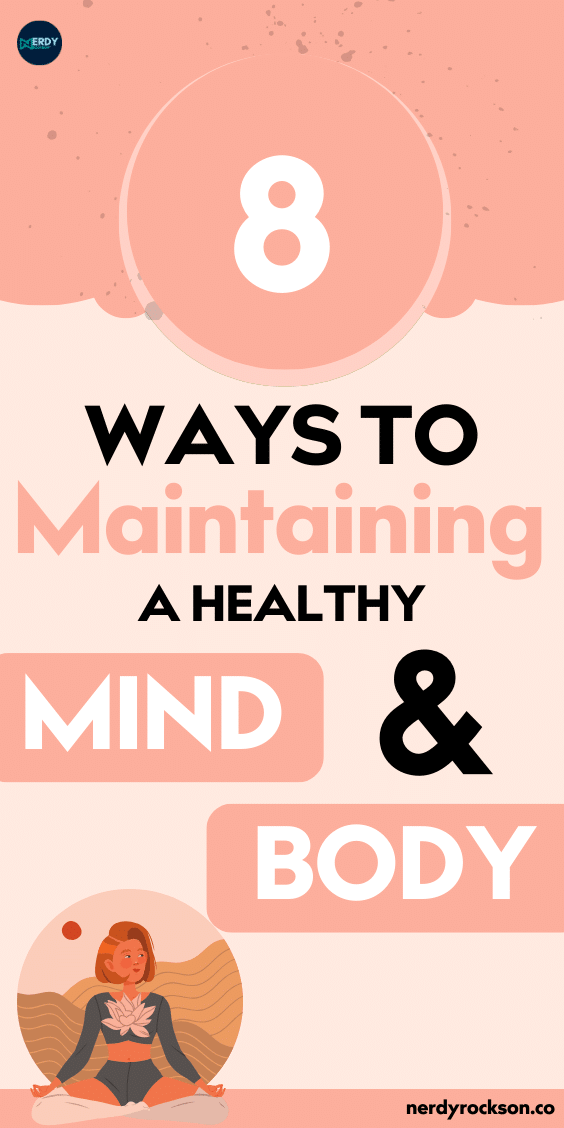
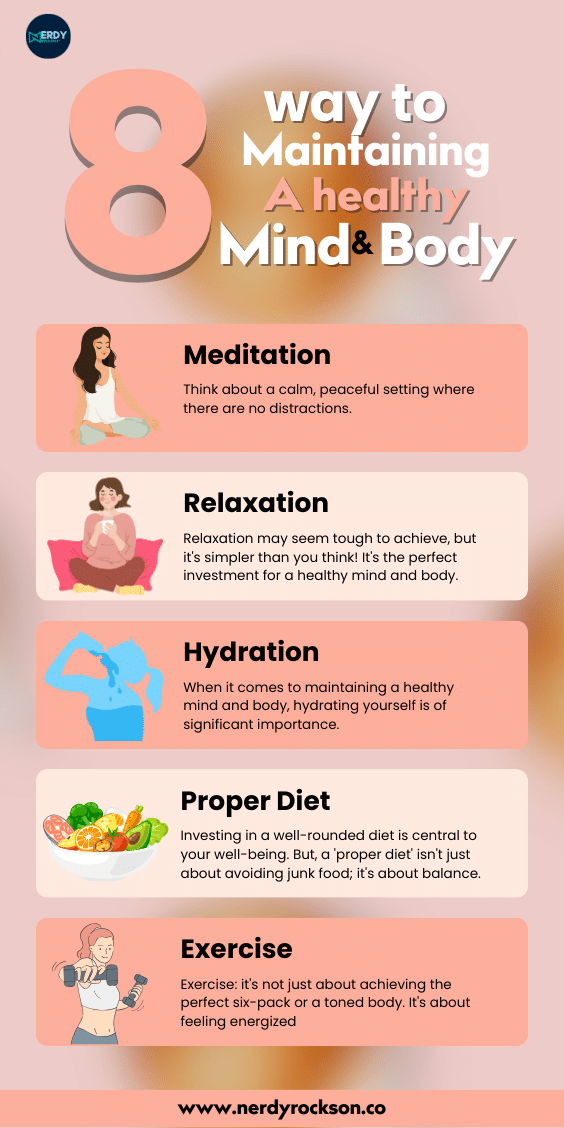
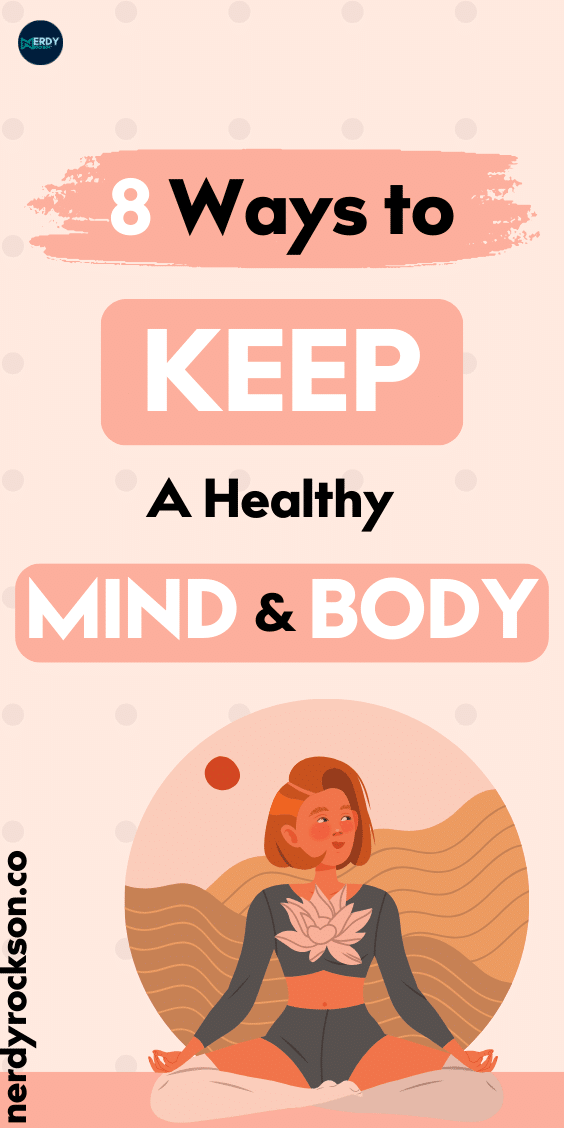
Reference
[1] ^ National Institutes of Health: Health benefits of physical activity: the evidence
[2] ^ News in Health: Positive Emotions and Your Health
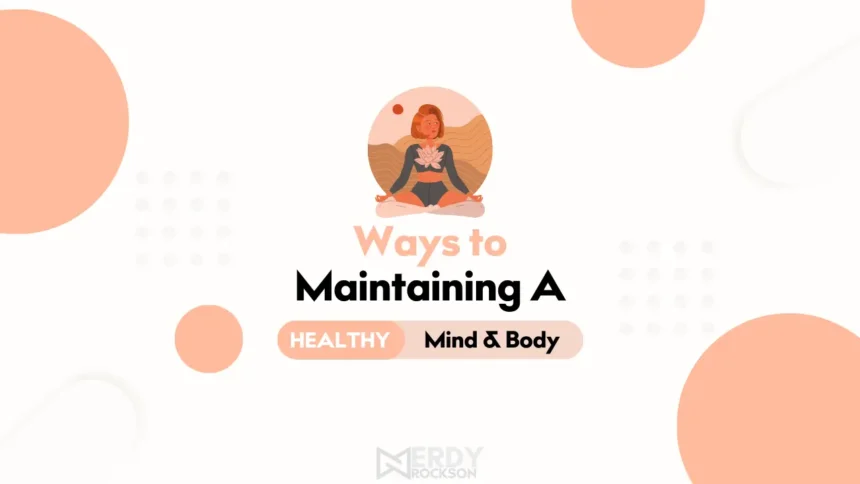




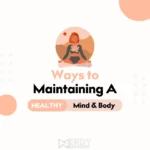


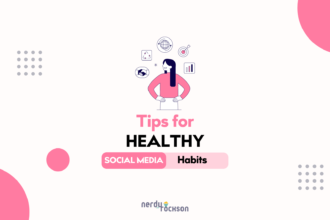

Nice one
Good piece
Great tips you have got here buddy. Do you accept guest post?